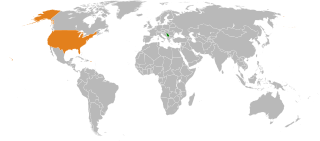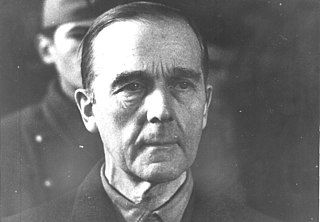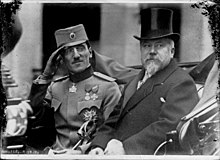
Slobodan Jovanović was a Serbian and Yugoslav writer, historian, lawyer, philosopher, literary critic, diplomat, politician and one of the most prominent intellectuals of his time. He was the professor at the University of Belgrade Faculty of Law (1897—1940), Rector of the University of Belgrade, and the President of the Serbian Royal Academy (1928–1931). He took part at the Paris Peace Conference (1919) as an expert for the Yugoslav Government.

A Germanophile, Teutonophile, or Teutophile is a person who is fond of German culture, German people and Germany in general, or who exhibits German patriotism in spite of not being either an ethnic German or a German citizen. The love of the German way, called "Germanophilia" or "Teutonophilia", is the opposite of Germanophobia.
Dušan T. Bataković was a Serbian historian and diplomat. His specialty was modern and contemporary Serbian and Balkan history as well as French-Serbian relations. The last post he held was that of Director of the Institute for Balkan Studies at the Serbian Academy of Sciences and Arts.

Relations between Serbia and the United States were first established in 1882, when Serbia was a kingdom. From 1918 to 2006, the United States maintained relations with the Kingdom of Yugoslavia, the Socialist Federal Republic of Yugoslavia (SFRY), and the Federal Republic of Yugoslavia (FRY), of which Serbia is considered shared (SFRY) or sole (FRY) legal successor.

Russia–Serbia relations are the bilateral foreign relations between the Russian Federation and the Republic of Serbia. The countries established official diplomatic relations as the Russian Empire and Principality of Serbia in 1816. Russia has an honorary consulate and embassy in Belgrade, and a liaison office to UNMIK, the capital of the disputed territory of Kosovo. Serbia has an embassy in Moscow, an honorary consulate in St. Petersburg and has announced to open a consulate-general in Yekaterinburg.

France–Kosovo relations are the bilateral relations between the French Republic and the Republic of Kosovo. When Kosovo declared its independence from Serbia on 17 February 2008, France became one of the first countries to announce officially about recognition of sovereign Kosovo. France has an embassy in Pristina. Kosovo has an embassy in Paris. The two countries enjoy very good and friendly relations.

Romania–Serbia relations are the bilateral relations between Romania and Serbia. Both are Southeastern European countries sharing common history, geography and a 546.4 kilometres long border, Romania and Serbia established diplomatic relations on April 19, 1841. Both countries are members of the Council of Europe and the Organization for Security and Co-operation in Europe.

Foreign relations exist between Austria and Serbia and their predecessor states. Austria has an embassy in Belgrade. Serbia has an embassy in Vienna and a general consulate in Salzburg. Austria is a European Union member and Serbia is a European Union candidate.

British – Serbian relations are foreign relations between the United Kingdom and Serbia. Both countries established diplomatic relations in 1837. The UK has an embassy and consulate in Belgrade and Serbia has an embassy in London. The Serbian ambassador to the United Kingdom is Dr Dejan Popovic and the British ambassador to Serbia is Sian MacLeod.

Portuguese-Serbian relations date back to 1882. Portugal has an embassy in Belgrade, and Serbia has an embassy in Lisbon. Despite support by Portugal for the independence of Kosovo, Serbian Prime Minister Mirko Cvetković was keen to improve bilateral cooperation. Also, Portugal is backing Serbia's accession to the European Union (EU).

Montenegrin–Serbian relations are foreign relations between Montenegro and Serbia. From 1918 until 2006, the two states were united under the Kingdom of Yugoslavia, the Socialist Federal Republic of Yugoslavia, and Serbia and Montenegro. Since 2006, there have been sporadic instances of debate on Montenegro's legitimacy as a separate state as well as much more prominent controversial debate on the Montenegrin ethnic identity. Despite this, the two countries have maintained mostly friendly geopolitical and economic relations.

Serbian–Turkish relations are foreign relations between Serbia and Turkey. Serbia has an embassy in Ankara and a consulate-general in Istanbul. Turkey has an embassy in Belgrade. Both countries are full members of the Council of Europe, the Organization for Security and Co-operation in Europe (OSCE), the Central European Free Trade Agreement (CEFTA) and the Organization of the Black Sea Economic Cooperation (BSEC). Turkey is a member of NATO. Serbia instead is not a member of NATO.

The Institute for Balkan Studies of the Serbian Academy of Sciences and Arts is a division of the Serbian Academy of Sciences and Arts that focuses on the historical, social, and anthropological study of the Balkans and its peoples. It is in the building of the Serbian Academy of Sciences and Arts in downtown Belgrade.

Germany–Serbia relations are foreign relations between Germany and Serbia. Both countries established diplomatic relations on 18 January 1879. Germany has an embassy in Belgrade. Serbia has an embassy in Berlin and five general consulates. There are around 505,000 people of Serbian descent living in Germany. Germany is a European Union member state and Serbia is a European Union candidate.

Heinrich Dankelmann was a Luftwaffe General who served as the third Military Commander for the Territory of the Military Commander in Serbia from 23 July to 20 October 1941. During his tenure as commander he oversaw numerous war crimes against the population, most famously hanging of five prisoners at Terazije Square. He was sentenced to death and executed for war crimes in Yugoslavia in 1947.

The Army of the Kingdom of Serbia, known in English as the Royal Serbian Army, was the army of the Kingdom of Serbia that existed between 1882 and 1918, succeeding the Armed Forces of the Principality of Serbia and preceding the Royal Yugoslav Army.

Pavle Popović was a Serbian literary critic and historian, a professor and rector at the University of Belgrade. He is the brother of Bogdan Popović, also a well-known and equally influential literary critic and university professor.

Milan Mojsilović is the Chief of General Staff of the Serbian Armed Forces, having been appointed on 14 September 2018.

Poland–Yugoslavia relations were historical foreign relations between Poland and now broken up Yugoslavia.

United Kingdom–Yugoslavia relations were historical foreign relations between United Kingdom and former Yugoslavia. Relations between United Kingdom and independent South Slavic states developed before creation of Yugoslavia following the decline of the Ottoman Empire.


























